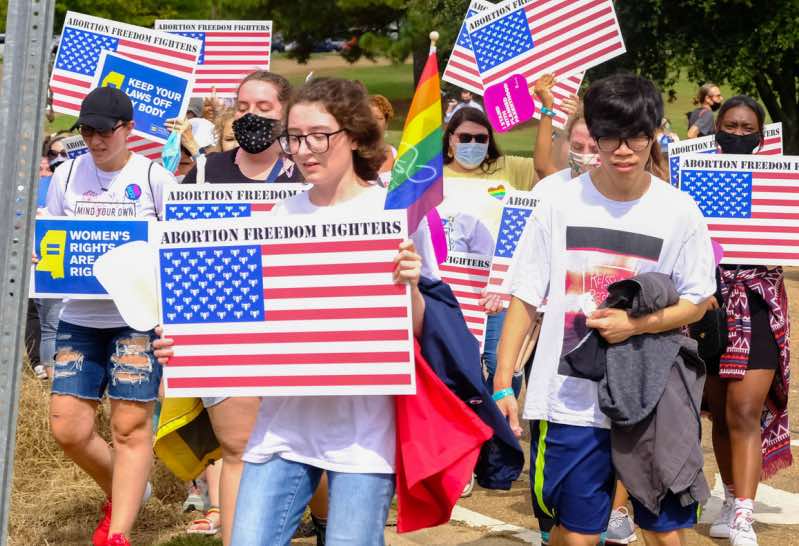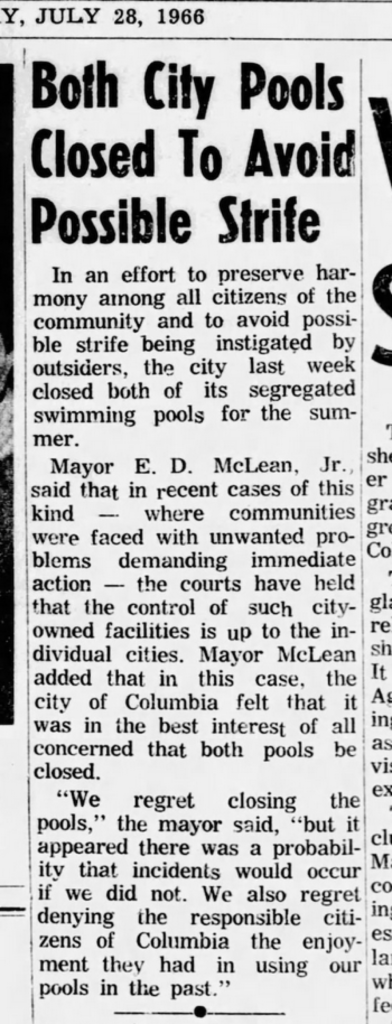
Editor’s Note: This story was originally published by the Mississippi Free Press at https://www.mississippifreepress.org/32595/what-happens-in-mississippi-never-stops-in-mississippi
As a kid in my hometown of Columbia, Miss., I remember hearing adults remark about how there used to be public pools in town when they were young, and I would wonder why the pools weren’t still there for my enjoyment, too. “In an effort to preserve harmony among all citizens of the community and to avoid possible strife being instigated by outsiders, the city last week closed both of its segregated swimming pools for the summer,” the Columbian-Progress announced on its front page on July 28, 1966.
Ah, of course. Racism is, once again, the reason we can’t have nice things. The news article, which included no byline, did not say what the source of the strife was or who the alleged “outsiders” it mentioned were. As my husband, Liam, said when I showed him the clipping, “the authors of the first draft of history didn’t want that particular bit recorded.” But it’s clear that the City decided to deprive Black and white residents alike of public swimming pools rather than integrating them as the federal courts and the Constitution demanded.

That same spirit is apparently alive in Llano County, Texas, where a Confederate memorial stands across the street from the local public library. After a judge ordered the library to restore books that conservative activists had successfully urged them to remove from their shelves, county officials met last week to discuss shutting down the library entirely—rather than allowing it to continue operating with books on the shelves that some residents do not like. Amid public pressure, they reneged.
In Missouri, lawmakers are now even considering eliminating funding for libraries statewide in response to moral panics over which books should—and should not—be on the shelves. Just as efforts to ban books have spread across the nation, pool closures spread across Mississippi and throughout the South during the 1960s and into the 1970s. One South Carolina town even put sea lions in their public pools to prevent integration.
It may have all seemed like a clear effort at evading integration, but after Jackson closed its segregated swimming facilities rather than integrate them, the U.S. Supreme Court ruled in 1971’s Palmer v. Thompson that doing so was perfectly legal and did not violate the Constitution’s guarantees of equal protection. After all, white residents and Black residents alike were all equally losing access to these public facilities. While we are often dismissed, Mississippi’s history and current events continue to be instructive—and even predictive—for the rest of the country. Before the battle over libraries reached the current fever pitch, Nick Judin broke the story in the Mississippi Free Press in January 2022 about efforts to purge LGBTQ+ books from the local public library in Ridgeland, Miss. (Ironically, it turned out that actual “outsiders” from California and Massachusetts were responsible for that effort).
In the almost year-and-a-half since, national efforts to ban books, particularly those authored by or about people of color and LGBTQ+ people, and to shut down libraries have exploded. In Missouri, lawmakers are now even considering eliminating funding for libraries statewide in response to the ongoing moral panics over which books should and should not be on the shelves.
Mississippi has been the mockingbird in the coal mine on other issues, too. In 2019, I reported in the Jackson Free Press on how state lawmakers were turning Mississippi into the battleground for Roe v. Wade’s future. I also interviewed a lawmaker who explicitly said that, with then-President Trump’s changes to the Supreme Court, he and other lawmakers were passing abortion bans in order “to start testing the limits of Roe.” Three Supreme Court justices would later cite that reporting in their dissent in Dobbs v. Jackson Women’s Health Organization.
The Mississippi Free Press series on Christian dominionism explained that movement’s deep involvement in pushing for the ultimate undoing of Roe v. Wade. Even after Roe v. Wade fell, some Americans in states outside the South continued to believe it would not affect them because their states have leaders who support abortion rights. But now, even abortion access in those states appears to be in peril after the same Christian legal organization that orchestrated and helped Mississippi Attorney General Lynn Fitch argue the Dobbs case succeeded in getting federal courts to at least partially block access to the abortion pill mifepristone.
Fitch, leading a coalition of 19 other anti-abortion state leaders, is urging the 5th U.S. Circuit Court of Appeals to revive an 1873 law and block the abortion pill nationwide. Those efforts could also pose risks to access to some form of birth control—an issue that reproductive-rights advocates in Mississippi were already raising alarm bells about in 2011 amid the fight over the Personhood Amendment here.
When Kayode Crown began reporting on efforts to install a state-appointed court to displace locally elected judges in 82%-Black Jackson, many across the country reacted in shock that white state leaders in Mississippi would take democratic power away from Black citizens. But not long after, the nation watched as white state lawmakers in Tennessee expelled two Black representatives from the state house there over matters of “decorum,” while not expelling the white woman representative who had joined them in protest against gun violence on the chamber’s floor.
What happens in Mississippi does not stay in Mississippi, and the Magnolia State is not the outlier that many who only ever offer sneers and derision for our state and our people would like to think. We know that our readership and supporters include not only Mississippians, but many people who live outside this state—including expats as well as people who have never set foot on Mississippi soil. And we will continue to strive to tell Mississippi stories that serve to better inform all of you about where this state and nation have been and where we are going.
This MFP Voices essay does not necessarily represent the views of the Mississippi Journalism and Education Group, the Mississippi Free Press, its staff or board members. To submit an opinion for the MFP Voices section, send up to 1,200 words and sources fact-checking the included information to azia@mississippifreepress.org. We welcome a wide variety of viewpoints.
